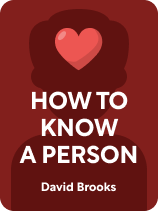

This article is an excerpt from the Shortform book guide to "How to Know a Person" by David Brooks. Shortform has the world's best summaries and analyses of books you should be reading.
Like this article? Sign up for a free trial here.
How impactful is culture on people’s lives? How can you address someone’s cultural history in an engaging conversation?
One way to engage more deeply with people’s stories is to look for the influence of their culture on the events they’re telling you about. Oftentimes, the way someone was raised determines the choices they make and how they perceive the world.
Here’s why you should keep the impact of culture in the back of your head when listening to someone’s story.
Recognize the Influence of a Person’s Culture and History
Brooks says some of the key events in a person’s story began long before they were born: in the history of the place they grew up or in the backstory of the people they’re descended from. He believes our ancestors’ history lives on in all of us. So, to really know a person, it helps to learn where they came from and the impact of culture on their view of the world and their place in it.
(Shortform note: A classic example of our culture and history’s influence on our behavior and self-perception is the comparison of individualist and collectivist cultures. Social psychologists explain that in individualist cultures, common in North America and Western Europe, people tend to prioritize independence and define themselves by individual traits. Conversely, collectivist cultures, prevalent in many Asian and South American countries, emphasize group harmony and social roles, and people often define themselves in relation to their community. These differences affect everything from a person’s career choices to their communication style—and understanding them can help you see where someone is coming from, too.)
Brooks explains that you can simply ask a person how their life has been shaped by their ancestors or by the culture of the place where they grew up. Often, people have ideas about how these influences have shaped their life, their character, and the way they relate to others. But as we discussed earlier in the guide, relying on stereotypes is counterproductive. (That’s why it’s crucial to learn about how a person’s background has impacted them by simply asking them.) Brooks also notes that it’s often wise to get an idea of how closely they identify with or separate themselves from their culture. Not everybody has the same relationship with the people and places they come from, and while the social groups we’re part of provide important context, we can’t be reduced to them.
(Shortform note: While Brooks suggests asking about a person’s background, some people caution against this approach. These questions, even when asked out of genuine curiosity, can inadvertently reinforce feelings of otherness and be perceived as microaggressions. This effect can be particularly significant for those who already feel different in a given environment, as these questions can carry assumptions about race or ethnicity and suggest they don’t belong. Instead of asking about someone’s background, some experts say it can be more effective to listen as people naturally share details about themselves in conversation. That way, you can focus on getting to know the individual rather than categorizing them based on their origins.)

———End of Preview———
Like what you just read? Read the rest of the world's best book summary and analysis of David Brooks's "How to Know a Person" at Shortform.
Here's what you'll find in our full How to Know a Person summary:
- The benefits of really getting to know other people
- How to better understand people on a personal level
- Why our morality and relationships are in a crisis






